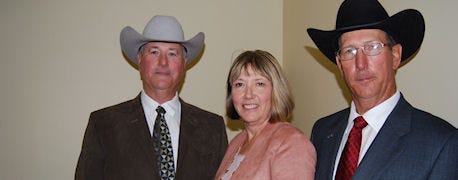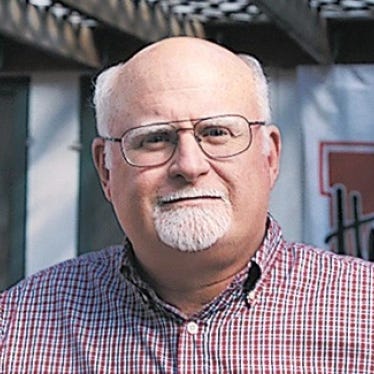
There was something about the dunes, wet meadows, lush grass and water of the Sandhills that captured Benjamin Franklin Buell's fancy more than 130 years ago. He had left Michigan, traveled through the Sandhills on his way to Washington where he worked there a short time. But he returned to settle in Nebraska in 1882.
Today, Shovel Dot Ranch near Rose is owned and managed by brothers Homer and Larry Buell and their wives, Darla and Nickie, respectively. They are the fourth generation of the family to sustain the ranching operation.

From left are Larry Buell, Darla Buell and her husband, Homer.
In late April, Homer and Larry and 20 members of their families were in the State Capitol as they were recognized with the 2012 Nebraska Leopold Conservation. The award is sponsored by the Nebraska Cattlemen, Cargill and the Wisconsin-based Sand County Foundation. Since 2006, seven Nebraska beef operations have earned the prestigious award.
It is named after Aldo Leopold, a renowned conservationist, landowner and author.
At the award presentation on Earth Day, Gov.
Dave Heineman cited the conservation work of the Buells and pointed to the benefits of private land ownership. "More than 90% of Nebraska's land is used for farming and ranching," he said. "It is being well cared for by those who take responsibility of leaving things better for future generations."
The award came with a$10,000-prize and a Leopold crystal.
The Buells continue to maintain and expand upon an environment in which water quality and the region's native plant life and animal habitat can flourish alongside livestock and crop production. With the help of the Natural Resources Conservation Service, the family installed high-tensile electric cross fencing and more than 50 miles of pipeline, watering nearly 100 pastures. This allows for more effective cattle distribution, giving pastures more rest between grazing periods, which leads to improved recovery, better ground cover, and increased production.
According to Homer, many of the family's' management decisions are made to benefit wildlife habitat. About 50 acres is fenced off around two lakes on their land to provide space for deer, turkey, swan, ducks, and geese. Abundant vegetation along two creeks on the ranch attracts several native wildlife species and trees are planted to provide windbreaks for cattle and habitat for turkey and deer.
"It's nice to be able to do the right thing for the land and wildlife, but we also have to be profitable," Homer said. "We don't do what we do to win awards. We do what's best for the land."
He cited the knowledge gained from University of Nebraska-Lincoln research, specifically regarding grazing management and beef nutrition.
"The determined, dedicated and innovative Buell family clearly cares about the health of natural resources in the Sandhills region and Nebraska, in general," according to Brent Haglund, Sand County Foundation president. "A commitment to open space, clean air and water and robust plant life and animal habitat is synonymous with the name 'Buell' and has been for many generations."
Other partners in the Nebraska Leopold conservation program are Burlington Northern Sante Fe, Farm Credit Services of America, The Lynde and Harry Bradley Foundation, Natural Resources Conservation Service, Nebraska Environmental Trust, Nebraska Farm Bureau, Nebraska Game and Parks Commission, Nebraska Land Trust, Nebraska Nature Conservancy, Rainwater Basin Joint Venture, Sandhills Task Force, The Nature Conservancy and Union Pacific.
In 2012, Sand County Foundation will also present Leopold Conservation Awards in California, Colorado, South Dakota, Texas, Utah, Wisconsin and Wyoming.
About the Author(s)
You May Also Like






